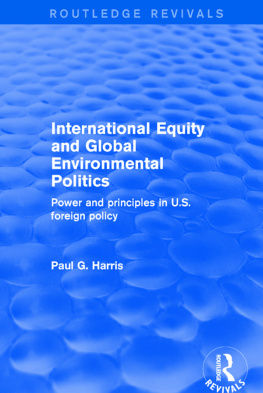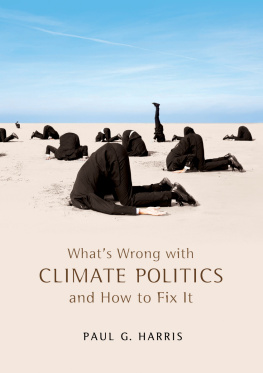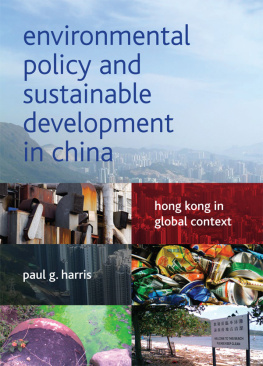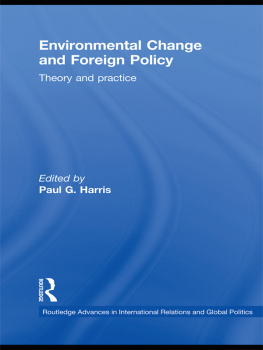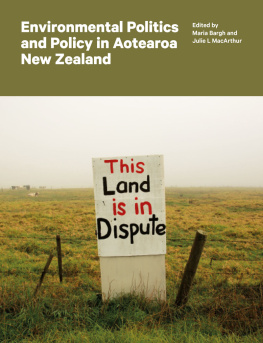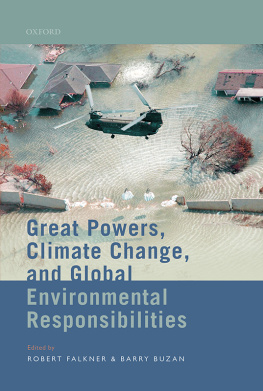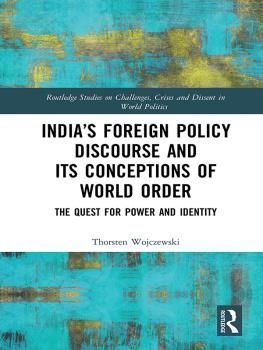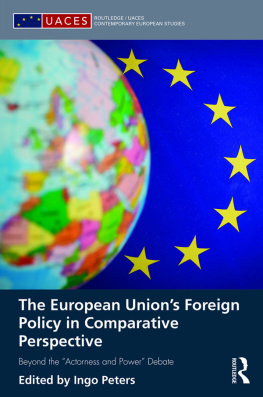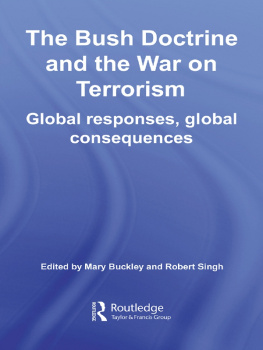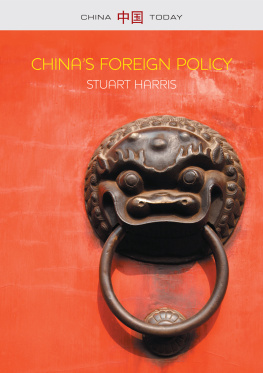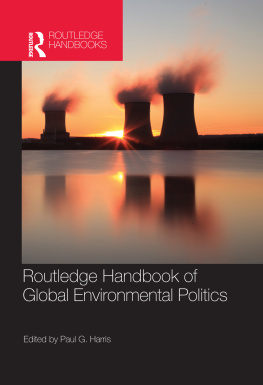First published 2001 by Ashgate Publishing
Reissued 2018 by Routledge
2 Park Square, Milton Park, Abingdon, Oxon OX14 4RN
711 Third Avenue, New York, NY 10017, USA
Routledge is an imprint of the Taylor & Francis Group, an informa business
Copyright Paul G. Harris 2001
All rights reserved. No part of this book may be reprinted or reproduced or utilised in any form or by any electronic, mechanical, or other means, now known or hereafter invented, including photocopying and recording, or in any information storage or retrieval system, without permission in writing from the publishers.
Notice:
Product or corporate names may be trademarks or registered trademarks, and are used only for identification and explanation without intent to infringe.
Publishers Note
The publisher has gone to great lengths to ensure the quality of this reprint but points out that some imperfections in the original copies may be apparent.
Disclaimer
The publisher has made every effort to trace copyright holders and welcomes correspondence from those they have been unable to contact.
A Library of Congress record exists under LC control number: 2001091619
ISBN 13: 978-1-138-73566-8 (hbk)
ISBN 13: 978-1-315-18648-1 (ebk)
It is scarcely necessary to be a student of international affairs to see that preponderant power gives the society that enjoys it unique purchase in international relations. With the demise of Soviet power, the United States of America has been left, alone by a wide distance, at the head of the league table of world powers. If its position was contested up to 1990, we can nevertheless say with some certainty that the period beginning in 1940 is the American century. Despite the aspirations of some, Europe will have to do a great deal to reorganize itself before it can come to rival the United States; and both China and India have a long way to go before they can contest the top spot, even if at least one of them may do so within a generation.
Americas preponderance is not just a question of economic and military strength. It is also a question of cultural strength, both at the popular and elite levels. The popular media across the world are dominated by American material, which shapes the minds and lifestyles of coming generations. For better or worse, the young in particular identify with American popular music and a range of American artifacts and foods, for example. This appears to be so even where there are strong forces of domestic cultural resistance. At the level of elites, there are aspirations to American lifestyles and consumption patterns, as well as subscription to patterns of thought and philosophies of political economy and institutional management that owe much to the Atlantic tradition. As at many times in history, a particular national culture is the standard-setter and supplier of the lingua franca for an international elite. In our times, much to the frustration of Europeans, Indians, Chinese and Japanese, and particularly of the defenders of French civilization, that leading culture is undoubtedly American.
The influence of that culture is abundantly evident in international environmental policy. Recent books edited by Paul G. Harris comprehensively demonstrate how the international community has often had to dance to the American tune in the last 20 years, not only on ozone but also on climate change and other environmental issues. Since global climate change policy cannot be effective if the United States is left outside it, the United States has been able to deploy its power and influence to shape agreements in ways acceptable to it. The same kind of processes can been seen in other areas, especially those which the American people and their tribunes perceive as being significant for the US economy (for example, biodiversity, agricultural technology and trade issues). Beyond that, a wider intellectual influence can be discerned, touching on basic approaches to environmental policy and the kind of policy tools to which preference should be given. This is reinforced and mediated through the Organization for Economic Co-operation and Development, the World Bank, and other international institutions.
So Paul G. Harris is mining a very rich vein through his expertise in U.S. environmental policy. In this volume, he looks closely at the issue of international equity. If climate change is looked at through the lens of ethics, questions of distributional impactof who will bear the burdens of change, of who will be better off and who worse offloom very large. These questions must be of concern to local, national and international communities for purely prudential reasons: sharp changes in wealth, the exacerbation of extreme poverty, and severe food insecurity can all be expected to breed tension and armed conflict. But bound up in such prudential considerations are ethical questions: the sense of injustice is, for example, in itself a powerful motivator of conflict. Moreover, in democracies, issues of morality, moralism, emotion, international reputation and pride often muddy the waters, as more traditionally educated diplomats are sometimes inclined to argue, of national self-interest in foreign policy. This is particularly so in todays global democracy facilitated by the electronic media. And the ethical, even the moralistic, dimension has been significant in US foreign policy from the very foundation of the republic.
More widely, the ethical dimension of environmental policy is itself of great, but often completely un-remarked, significance: almost any environmental goal, and any environmental tool or set of tools to attain the goal, raises the question of who has what and who will have what, and therefore the question who ought to have what. This tends to be well recognized with respect to the environmental externalities imposed by capitalist firms. However, the universality of the issuethe externalities that each person imposestends to be ignored. When the dimension of human rights and the rights of the rest of nature are raised, new layers of complexity are introduced. Penetrating still further into environmental ethics, there are layers of complexity, too, in the ethics of process.
Paul G. Harris is to be applauded for his happy foresight in bringing together the issues of U.S. environmental foreign policy and environmental ethics, in particular the question of equity. I am particularly happy that a period as a Visiting Fellow at the Oxford Centre for the Environment, Ethics and Society (OCEES) at Mansfield College, Oxford University, gave impulsion to the interests demonstrated in this book. One of our missions at OCEES is to help policymakers and citizens, as well as academics, think more consciously and carefully about the relationships between ethics, environmental change, and how we live. That is what this book does. It is a welcome addition to thought about these issues, and I am grateful that OCEES is associated with it.
Neil Summerton, Director
Oxford Centre for the Environment, Ethics and Society Mansfield College, Oxford University


